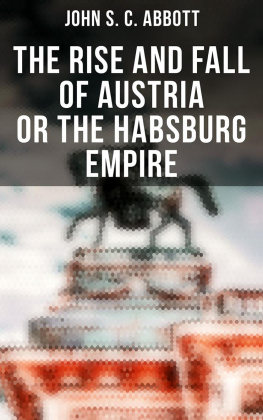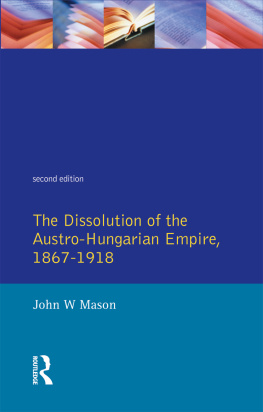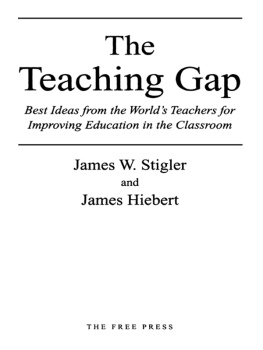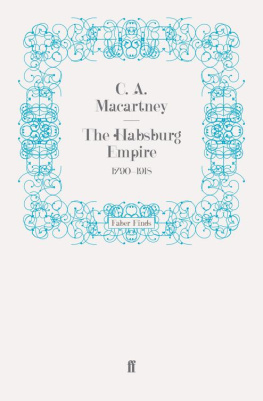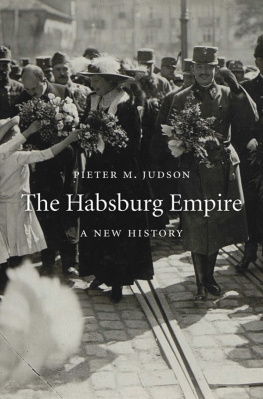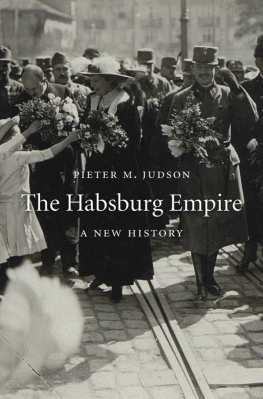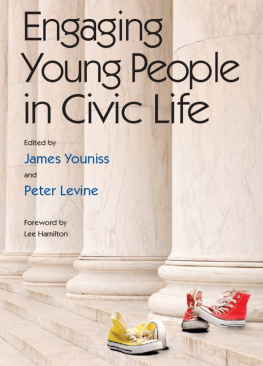
TEACHING THE EMPIRE
Central European Studies
Charles W. Ingrao, founding editor
Paul Hanebrink, editor
Maureen Healy, editor
Howard Louthan, editor
Dominique Reill, editor
Daniel L. Unowsky, editor
Nancy M. Wingfield, editor
The demise of the Communist Bloc a quarter century ago exposed the need for greater understanding of the broad stretch of Europe that lies between Germany and Russia. For four decades the Purdue University Press series in Central European Studies has enriched our knowledge of the region by producing scholarly monographs, advanced surveys, and select collections of the highest quality. Since its founding, the series has been the only English-language series devoted primarily to the lands and peoples of the Habsburg Empire, its successor states, and those areas lying along its immediate periphery. Among its broad range of international scholars are several authors whose engagement in public policy reflects the pressing challenges that confront the successor states. Indeed, salient issues such as democratization, censorship, competing national narratives, and the aspirations and treatment of national minorities bear evidence to the continuity between the regions past and present.
Other titles in this series:
Croatian Radical Separatism and Diaspora Terrorism During the Cold War
Mate Nikola Toki
Jan Hus: The Life and Death of a Preacher
Pavel Soukup
Making Peace in an Age of War: Emperor Ferdinand III (16081657)
Mark Hengerer
Universities in Imperial Austria 18481918:
A Social History of a Multilingual Space
Jan Surman
A History of Yugoslavia
Marie-Janine Calic
The Charmed Circle: Joseph II and the Five Princesses, 17651790
Rebecca Gates-Coon
TEACHING THE EMPIRE
Education and State Loyalty
in Late Habsburg Austria
Scott O. Moore
Purdue University Press West Lafayette, Indiana
Copyright 2020 by Purdue University.
All rights reserved.
Printed in the United States of America.
Cataloging-in-Publication data is on file at the Library of Congress.
Paperback ISBN: 978-1-55753-895-6
ePub: ISBN: 978-1-55753-896-3
ePDF ISBN: 978-1-55753-897-0
Cover image: Kinderhuldigung in Schnbrunn: Beschreibung: Franz Joseph vor einer huldigenden Mdchengruppe. Technik: Fotografie: Datierung: 21.05.1908: Personen.
To my mother, Marie
Contents
This book would have been impossible without the assistance of many people. I would like to take this time to thank them for their contributions to this work. While each of these individuals helped me to complete this study, any errors or mistakes are mine alone.
I would like to begin by thanking Marsha Rozenblit for her years of guidance and mentorship, and Howard Louthan for his advice and support. This project was made stronger by the constructive suggestions of Gary Cohen, Margarete Grandner, Gay Gullickson, John Lampe, Judith Torney- Purta, and the assistance and encouragement of Courtney Broscious, Jason Ciejka, Peter Hyng, Kate Keane, Thomas Moore, and Frederic Tate. I also am grateful to Thomas Balcerski, Caitlin Carenen, Bradley Davis, David Frye, Stefan Kamola, Anna Jaroszyska-Kirchmann, Joan Meznar, Jamel Ostwald, and Barbara Tucker, my amazing colleagues in Eastern Connecticut State Universitys history department.
I am equally indebted to the staff of all of the archives and libraries I used and am grateful for their assistance. In particular, I would like to thank the staff of the sterreichischen Nationalbibliothek, Lorenz Mikoletzky of the sterreichisches Staatsarchiv, Stefan Spevak and Jakob Whrer of the Wiener Stadt- und Landesarchiv, Clemens Steinhuber of the library of the MAK, Vienna, Viktoria Etzlstorfer of the Obersterreichisches Landesarchiv, Markus Altrichter of the Archiv der Stadt Linz, Pavel Koblasa of the Nrodn archiv in the Czech Republic, and Veronika Knotkov of the Archiv hlavnho msta Prahy. I am similarly grateful to Justin Race, Katherine Purple, Christopher Brannan, and the rest of the amazing team at Purdue University Press. They have made the editorial process a pleasure.
This project would have been impossible without the generous Fulbright-Mach research fellowship provided by Fulbright Austria and the sterreichisches Austauschdienst (OeAD). Beyond financial assistance, Lonnie Johnson of Fulbright Austria, Lydia Skarits of the OeAD, and their respective staffs ensured that my research proceeded smoothly and successfully. I am also grateful to the history department of the University of Maryland and the donors who provided funding in the form of the Gordon Prange History Department Dissertation Writing Fellowship, the Samuel Merrill Graduate Student Research Award, and the Arts and Humanities Travel Awards. A faculty development grant and the John Fox Slater Fund for Historical Research from Eastern Connecticut State University allowed me to finish the research for this book, and I am thankful for their continued support.
There are no words that can express my gratitude to the amazing staff members who have helped me along the way. I would especially like to thank Jodi Hall, Catherine Pickles, Paula Barriga Sanchez, and Catalina Toala at the University of Maryland and Brenda Schiavetti at Eastern Connecticut State University for their assistance and friendship. Finally, I would like to thank my partner, Michael, my father, Victor, my sister, Mandie, and all of my friends for their encouragement during this entire process.
Note: Parts of .
Introduction
In the second half of the nineteenth century, school officials in Habsburg Austria designed and implemented a robust system of civic education in elementary and secondary schools. This system was intended to make students become patriotic citizens and to help them develop an attachment to the multinational Habsburg state. The officials attempted to accomplish these goals in a way that constructively utilized existing national and regional identities, hoping these identities could strengthen, rather than diminish, the cohesion of Austria. Instead of attempting to forge an Austrian national identity, Austrian civic education promoted a layered identity that allowed for ethnic, national, and regional identities to exist within an imperial, supranational, Austrian framework. This layered identity was unique and represented an alternative to models of civic education that relied on language, culture, and nationality to serve as the primary unifying force within a state.
Civic education, a states effort to develop the loyalty of its citizens, prepare them to operate in political and civil society, and shape the way they regard their government, became a vital component of the public school curriculum in Europe and the United States in the second half of the nineteenth century. On a basic level, civic education in public school taught children how their state operated, how their government was organized, and their rights and obligations as citizens. Civic education also helped to articulate the common myths, heroes, and ideas that could bind a society together. It helped children think of themselves as members of the community of the state. In Austria-Hungary, the Habsburg dynasty served as the strongest connective thread binding its diverse lands and peoples, making Austrian identity an imperial identity. This dynastic union also meant that Austrian identity was supranational in nature. An individual was Austrian because he or she lived in the Habsburg Monarchy, not because he or she belonged to a specific national, ethnic, or linguistic group. As a result, Austrian identity was inclusive, rather than exclusive, and could be embraced by everyone within the Monarchys borders.



